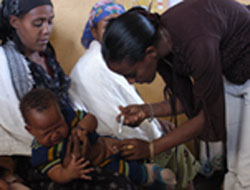4.1 Getting organised
As you might expect, getting organised is the first stage in bringing together the right combination of human, physical and financial resources to successfully undertake your planned activities. Your health plan will require the involvement of different members of your community to make up a team and you will also need a variety of other resources (Figure 4.1). As the Ethiopian proverb says, ‘When spiders’ webs unite, they can tie up a lion.’
You will find that organising activities or groups of activities involves planning all your activities in order to avoid any duplication of jobs. For instance, if activities are not properly arranged, two or more people may end up doing the same job at the same time.
Box 4.1 Getting organised
Organising is the means by which:
- the right things are done (what)
- in the right place (where)
- at the right time (when)
- in the right way (how)
- by the right people (by whom).
Look closely at Box 4.1. How else could you describe getting organised?
The box shows that organising is the means of distributing authority, providing channels of communication and arranging the work in order to achieve the correct outcome.
One of a Health Extension Practitioner’s most important functions when working in the community is the distribution of tasks among the members of their health team. Work should be arranged in such a way that team members make best use of their individual skills and talents. It is important to distribute work fairly. You may need to prepare a checklist which describes tasks among the health team. The checklist can state the objectives, activities and responsibility of each person.
Case Study 4.1 Allocating tasks to the health team
As the Health Extension Practitioner in your Health Post you have planned to conduct an immunization day. You have groups of community members to assist you, such as volunteers and health promoters, as well as you and your team in the Health Post.
Your first role is to identify all the activities which have to be performed and you will have to assign duties to your team of Health Extension Workers, volunteers, model household members and so on. You may need to group the tasks in such a way that you form committees or teams for particular activities.
The first team could do community mobilisation and awareness creation work; the second team could work on the practical arrangements of the immunization day; a third team could carry out the actual immunization activity.
Your next role is to select a team leader for each team. The role of the team leader is to coordinate the team members and also to communicate with you on the activities that the team is carrying out. Depending on the situation the team leader may also be responsible for finances.
Your final step is to allocate the resources (time, money, people, space and equipment) needed by each team. In summary, by being well organised you will be able to implement what you have planned (Figure 4.2).

What is the objective of the activity to be carried out in the case study?
To mobilise members of the community to participate in the immunization day and particularly to bring their children for vaccination.
You can use the checklist in Box 4.2 to help you when organising your health teams.
Box 4.2 Organising your team
Organising activities:
- What is to be done?
- Where will the action take place?
- When will the action take place?
- What equipment is needed?
- How will the activity be arranged?
Organising people:
- Which members of the health team will be involved?
- Who outside the health team will be involved?
- Who will do what?
- Who will lead?
Communicating:
- Is all necessary information available?
- Has the information been communicated?
Look back carefully at Box 4.2. Which of these activities is the most important to make sure that your team is organised to take part in health activities?
The whole point of organising your activities in this way is that all of these activities are equally important. Unless all these activities are undertaken your plan will not be implemented because people won’t know what to do, or how to do it.
Learning Outcomes for Study Session 4
